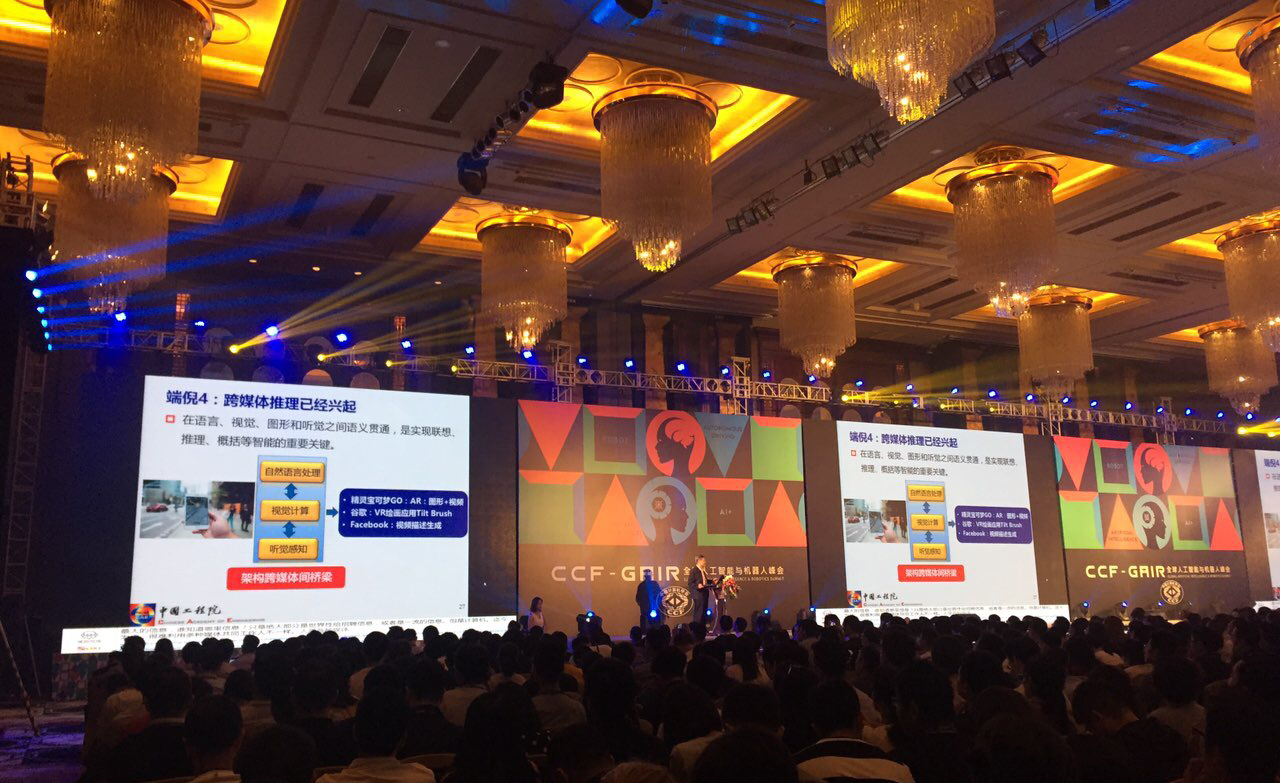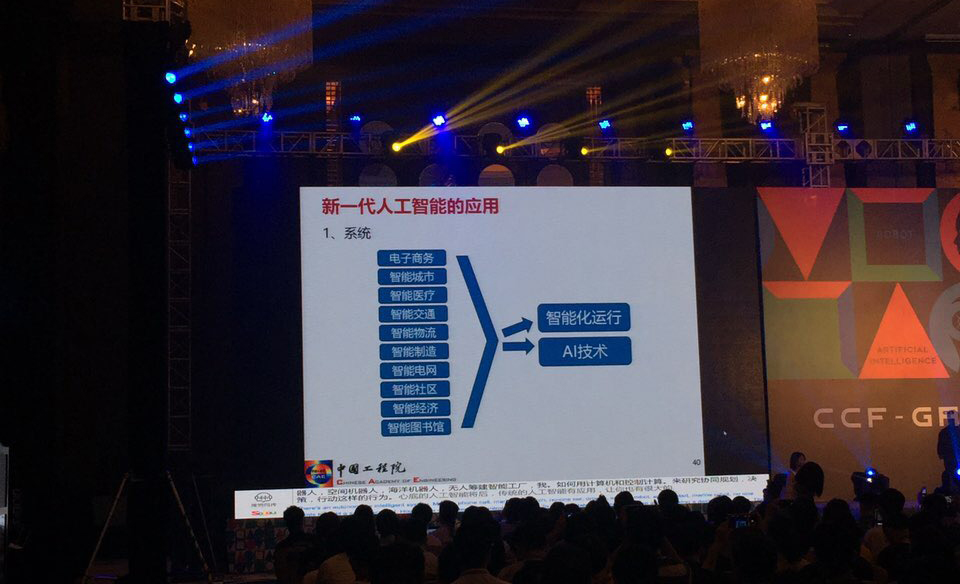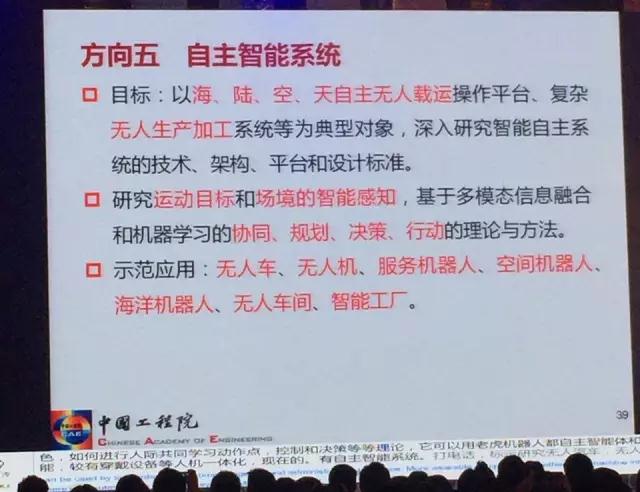CCF-GAIR Global Artificial Intelligence and Robotics Summit opens in Shenzhen
CCF-GAIR Global Artificial Intelligence and Robotics Summit opens in Shenzhen
Today, on the sixth floor of the Sheraton Shenzhen Convention and Exhibition Center, the Global Artificial Intelligence and Robot Summit was officially opened. The scene is grand + people and people are full of friends. The three-day CCF-GAIR conference is the largest, highest specification and cross-border in the field of artificial intelligence and robotics this year. A grand event, a lot of things I don't know, I won't talk about it, talk about some of my feelings.

The rise of artificial intelligence has forced companies to establish intelligent thinking as early as possible, such as e-commerce, intelligent cities, medical care, transportation, logistics, manufacturing, power grids, communities, economies, libraries, etc., so that machine systems can learn by themselves. Adaptation and discovery rules accelerate the commercialization of artificial intelligence in China.
From man-machine game to smart medical care, the wave of artificial intelligence today is a bit like the Internet+ in 2015 written by the article yesterday. The expectations of the public are constantly rising, and they are regarded as strategic opportunities that must not be missed. The wave of intelligent development is mainly led by enterprises.
At home, BAT continues to integrate artificial intelligence into its products and solutions. Taobao's product recommendation is becoming more and more accurate. Baidu's driverless technology has also made progress. The APLLO autopilot program was released two days earlier. These are applications that rely on artificial intelligence technology. “Photographing” can use photos to search for goods, mainly due to the maturity of image recognition technology. In addition, Keda Xunfei and JD.com have established their own advantages in the fields of speech recognition and logistics sorting. The application fields of artificial intelligence are unprecedented, from logistics management to intelligent transportation to smart medical treatment, and we have begun to change the operation modes of many traditional industries, which are not far from our lives.
Artificial intelligence technology is constantly integrated into life, from perception, prediction, guidance, to the formation of comprehensive programs, the ecosystem of value creation is taking shape. In the perception process, Keda Xunfei's Super Brain Program is supporting the commercialization of multiple projects, such as vehicle-assisted systems, voice processing systems, etc.; in the forecasting phase, artificial intelligence-based weather forecasting can improve energy efficiency; In the auxiliary guidance, smart medical care has begun to help doctors make judgments. Gene technology can help humans overcome diseases such as cancer. In the comprehensive program, the system scheme of driverless and even intelligent transportation has been perfected. These are big industries with over $100 billion.
From the perspective of the artificial intelligence commercialization process, basic support, key technologies, and application scenarios are three key elements. The basic support links include sensing equipment, user data, and cloud computing technologies; key technologies include visual processing, speech recognition, and deep learning; the application scenarios are the cities mentioned in the second paragraph, medical, transportation, logistics, manufacturing, etc. Wait. For example, the TBOX made by the speed-for-technology technology to the front-loading depot is a case. In the basic support link, it includes the control of the car lock through the CAN bus, the collection of GPS information, and the key basic data like BMS. The detection of technical data such as body condition and working conditions, key technologies include the data analysis mining and processing of the platform. Under the shared time-sharing application scenario, how to plan and dispatch vehicles in a coordinated manner to achieve the highest efficiency, and establish a data model through machine learning. Wait. At present, artificial intelligence applications still focus on the B-end, and the degree of integration with the traditional format is not very high, and the user experience is not enough.

Among them, data foundation, hardware capabilities, and algorithms are the three pillars of artificial intelligence. The spurt of data growth comes from China's huge user market. We have unique advantages in algorithms, models, and samples. Hardware capabilities are breaking through, such as "Light of Taihu Lake" (supercomputer), go to Baidu. The algorithm is a short board of artificial intelligence. It is based on shallow level of recognition and judgment. What kind of repetitive and simple labor is replaced by intelligence. For creative and artistic work, it is still very dependent on people, like sensibility and aesthetics. They are not that powerful.

In the future, artificial intelligence will be more intelligent, and deep learning will also carry out deep data value mining, let the whole machine system learn, adapt and develop itself, and find the rules by itself. For example, Meitu Xiu Xiu analyzes the user's judgment on “beauty” according to the user's habit of deleting and storing photos, making the lens more intelligent, automatically downloading and generating the filter used by the user, and taking pictures of the user's satisfaction. Is there any meaning? Self-portrait mad people, mobile phone manufacturers?
For enterprises, we can build such intelligent thinking, try and understand artificial intelligence technology, China's advantage is massive data, you can get Guinness records (except Chinese football), and face the problems. That is, there is no way for data to communicate, and lack of unified standards and many other factors will limit the rapid development of artificial intelligence.
The PPT of the guests are all more in-depth. With the increasing number of artificial intelligence cases, the continuous extension of application width, and the step-by-step breakthrough of technical obstacles, it can also form a huge user market. After the Internet wave, whether China can stand on the forefront again needs to look at the next few years.
